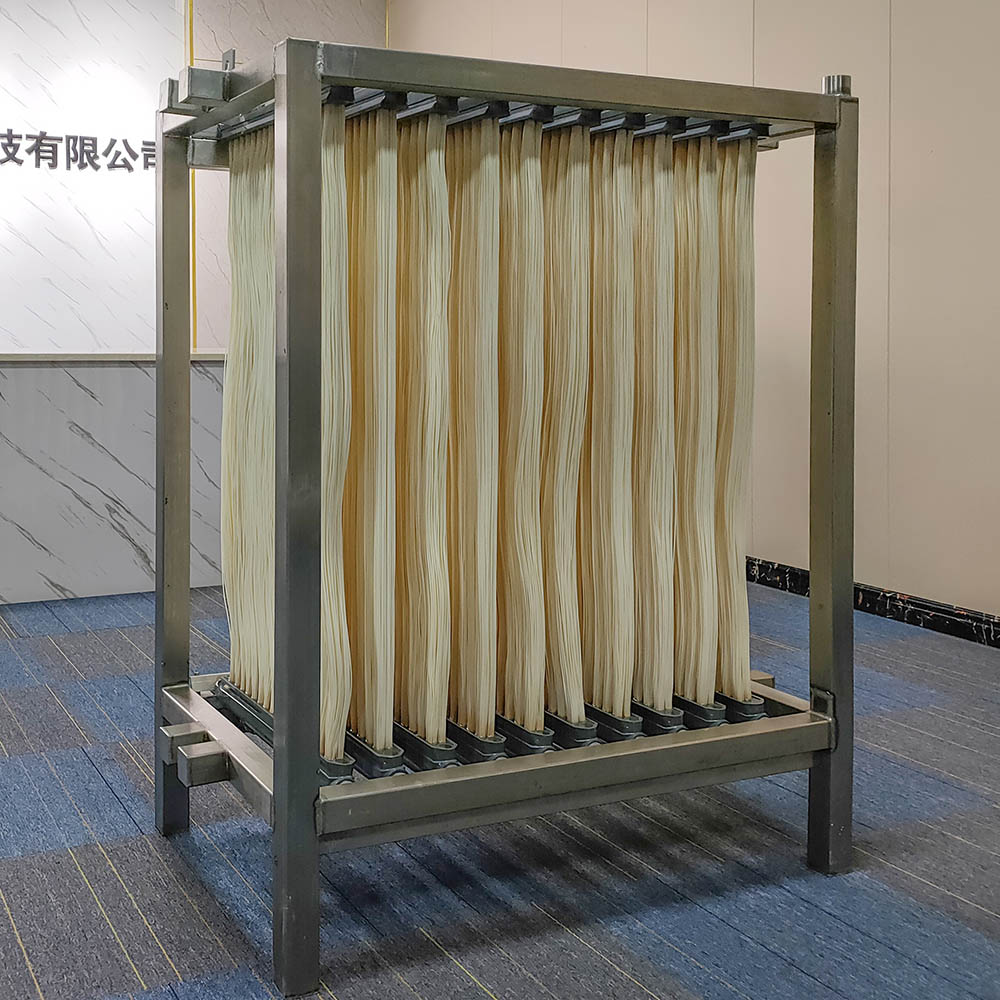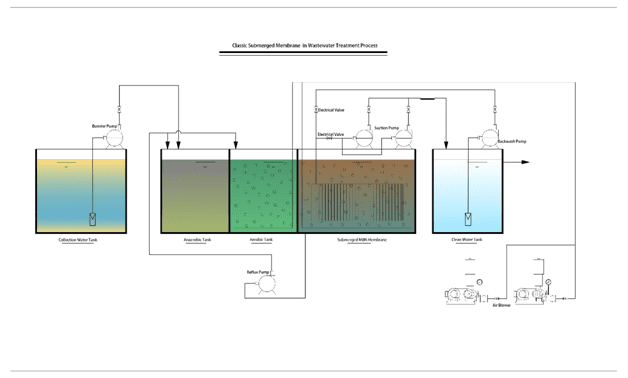How to Optimize Membrane Bioreactor Performance for Maximum Efficiency
Wiki Article
The Benefits of Membrane Bioreactors in Sustainable Wastewater Administration
Membrane bioreactors (MBRs) stand for an essential improvement in sustainable wastewater administration, efficiently combining biological therapy with advanced membrane purification innovation. As the need for lasting remedies escalates, checking out the diverse advantages of MBRs may disclose unexpected ramifications for the future of wastewater therapy systems.Summary of Membrane Layer Bioreactors
Membrane layer bioreactors (MBRs) represent a substantial innovation in wastewater treatment technology, integrating biological destruction with membrane layer purification to boost the effectiveness of the therapy procedure. This cutting-edge system integrates the advantages of traditional triggered sludge procedures with membrane innovation, allowing for improved solid-liquid separation. MBRs utilize semi-permeable membrane layers to separate cured water from biomass, leading to top quality effluent that can be reused or safely released into the environment.The functional layout of MBRs generally involves a bioreactor where microorganisms damage down raw material, followed by a membrane system that filters the combined alcohol. This arrangement not just minimizes the impact of the treatment center however additionally permits greater biomass concentrations and reduced hydraulic retention times. MBRs are capable of dealing with a bigger range of impurities, including nutrients and pathogens, making them ideal for numerous applications, from municipal wastewater therapy to commercial effluent handling.
The combination of MBRs right into wastewater administration systems is a measure of an expanding trend in the direction of lasting and reliable practices in environmental engineering. Their ability to produce high-grade effluent while decreasing area requirements placements MBR modern technology as a principal in contemporary wastewater treatment remedies.
Enhanced Effluent High Quality

The membrane filtration process functions as a physical barrier, enabling the retention of bacteria and particulate matter, which adds to a more clear and cleaner effluent (Membrane Bioreactor). Furthermore, MBRs operate at higher biomass focus than conventional activated sludge systems, advertising extra effective biodegradation of toxins. This results in a decrease in biochemical oxygen demand (FIGURE) and overall put on hold solids (TSS) degrees in the last effluent
In addition, MBRs show exceptional performance in treating difficult wastewater structures, such as commercial effluents and wastewater with high nutrient loads. Because of this, the effluent created is frequently of better, permitting even more adaptable disposal choices and decreased environmental effect. Inevitably, the improved effluent high quality achieved via MBR modern technology emphasizes its critical function beforehand sustainable wastewater administration techniques.
Water Reuse Opportunities
The premium effluent created by membrane bioreactors (MBRs) opens significant opportunities for water reuse in various applications. MBRs successfully eliminate contaminants, including pathogens, suspended solids, and raw material, causing treated water that fulfills or surpasses governing standards for reuse. This quality permits the application of water recycling efforts throughout varied industries.One noticeable application remains in farming, where treated wastewater can be made use of for irrigation, promoting sustainable farming methods while saving fresh water sources. Additionally, MBR-treated effluent can be made use of for commercial processes such as air conditioning, cleaning, and as a process water source, considerably minimizing the need for safe and clean water in these procedures.
In urban settings, MBRs promote making use of reclaimed water for landscape watering, toilet flushing, and other non-potable uses, adding to the overall strength of water systems. Furthermore, the integration of MBR technology in decentralized systems help in taking care of local water demands, specifically in water-scarce areas.
Lowered Environmental Impact
Just how can the fostering of membrane bioreactors (MBRs) add to a lowered environmental effect in wastewater monitoring? MBRs dramatically boost the therapy performance of wastewater while decreasing eco-friendly disturbances. By incorporating organic therapy processes with membrane filtering, MBRs successfully get rid of a large range of contaminants, consisting of natural issue, nutrients, and microorganisms. This visit here innovative filtration brings about higher-quality effluent, which is essential for securing water ecological communities and minimizing the concern on all-natural water bodies.Furthermore, MBRs operate at reduced hydraulic retention times compared to traditional systems, leading to smaller treatment plant impacts. This compact design decreases land usage, thus protecting all-natural environments and biodiversity. The process additionally produces less sludge than conventional approaches, minimizing disposal obstacles and lowering greenhouse gas exhausts connected with sludge administration.
Additionally, MBRs assist in the recuperation of important resources, such as water and nutrients, contributing to a round economic situation. By making it possible for water reuse for watering or commercial processes, MBRs help reduce freshwater shortage, therefore advertising lasting water use practices. Eventually, the fostering of MBR innovation stands for a substantial stride towards minimizing the environmental impact of wastewater monitoring systems.
Financial Benefits of MBRs

Additionally, MBRs assist in the production of top quality effluent, which can be reused for different applications, such as farming irrigation and industrial procedures - Membrane Bioreactor. This reuse ability can considerably lower water procurement expenses, providing a monetary reward for sectors dealing with rigid water laws
The portable style of MBR systems likewise results in lowered land demands, which is specifically useful in urban locations where property is costly. By reducing space, markets link and towns can save money on land purchase and maintenance costs.
Moreover, MBRs commonly need less frequent maintenance and have a longer life expectancy than standard systems, better adding to set you back savings. In recap, the financial benefits of MBRs-- ranging from reduced operational prices to land cost savings and effluent reuse-- make them a compelling selection for lasting wastewater monitoring, using both lasting and immediate economic advantages.
redirected here
Verdict
Membrane bioreactors represent a transformative strategy to lasting wastewater administration, combining biological therapy with advanced membrane layer filtering for exceptional effluent quality. Their capability for reliable pollutant removal assists in water reuse, thus saving crucial freshwater sources. Furthermore, MBRs add to lowered ecological influences via compact designs and lower sludge generation. Economic benefits further improve their stability, making MBRs an encouraging solution for dealing with the obstacles of wastewater therapy and advertising lasting source monitoring.
Membrane layer bioreactors (MBRs) represent a crucial advancement in sustainable wastewater administration, efficiently merging organic treatment with innovative membrane filtering technology.Membrane bioreactors (MBRs) stand for a considerable innovation in wastewater therapy technology, integrating organic destruction with membrane layer purification to enhance the performance of the therapy procedure.Accomplishing boosted effluent top quality is one of the most significant advantages of utilizing membrane bioreactors (MBRs) in wastewater therapy.In addition, MBRs show outstanding performance in treating tough wastewater structures, such as industrial effluents and wastewater with high nutrient tons.Incorporating membrane bioreactors (MBRs) into wastewater monitoring not just minimizes environmental impact yet also presents substantial economic benefits.
Report this wiki page